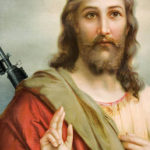We run our website the way we wished the whole internet worked: we provide high quality original content with no ads. We are funded solely by your direct support. Please consider supporting this project.

5 Ways the Bible Supports Open Theism
Open Theism refers to the belief that God created a world in which possibilities are real. It contrasts with Classical Theism which holds that all the facts of world history are eternally settled, either by God willing them so (as in Calvinism) or simply in God’s knowledge (as in Arminianism). Open Theists believe God created humans and angels with free will and that these agents are empowered to have “say so” in what comes to pass. In Open Theism, therefore, what people decide to do genuinely affects God and affects what comes to pass. In particular, by God’s own sovereign design, things really hang on whether or not God’s people pray.
The primary reason Open Theists believe what they do is because they find that Scripture presents the future as partly open. While there are certainly passages that depict God predetermining and foreknowing some aspects of the future, there are at least as many passages depicting God as facing a future partly comprised of possibilities. A small sampling of these sorts of passages are the following:
- The Lord frequently changes his mind in the light of changing circumstances, or as a result of prayer (Exod. 32:14; Num. 14:12–20; Deut. 9:13–14, 18–20, 25; 1 Sam. 2:27–36; 2 Kings 20:1–7; 1 Chron. 21:15; Jer. 26:19; Ezek. 20:5–22; Amos 7:1–6; Jonah 1:2; 3:2, 4–10). At other times he explicitly states that he will change his mind if circumstances change (Jer. 18:7–11; 26:2–3; Ezek. 33:13–15). This willingness to change is portrayed as one of God’s attributes of greatness (Joel 2:13–14; Jonah 4:2). If the future were exhaustively and eternally settled, as classical theism teaches, it would be impossible for God to genuinely change his mind about matters.
- God sometimes expresses regret and disappointment over how things turned out—even occasionally over things that resulted from his own will. (Gen. 6:5–6; 1 Sam. 15:10, 35; Ezek. 22:29–31). If the future was exhaustively and eternally settled, it would be impossible for God to genuinely regret how some of his own decisions turned out.
- At other times God tells us that he is surprised at how things turned out because he expected a different outcome (Isa. 5:3–7; Jer. 3:6-7; 19–20). If the future were eternally and exhaustively settled, everything would come to pass exactly as God eternally knew or determined it to be.
- The Lord frequently tests his people to find out whether they’ll remain faithful to him (Gen. 22:12; Exod. 16:4; Deut. 8:2; 13:1–3; Judges 2:20–3:5; 2 Chron. 32:31). If the future were eternally and exhaustively settled, God could not genuinely say he tests people “to know” whether they’ll be faithful or not.
- The Lord sometimes asks non-rhetorical questions about the future (Num. 14:11; Hos. 8:5) and speaks to people in terms of what may or may not happen (Exod. 3:18–4:9; 13:17; Jer. 38:17–18, 20–21, 23; Ezek. 12:1–3). If the future were exhaustively and eternally settled, God could never genuinely speak about the future in terms of what “may” or “may not” happen.
So the Bible presents God as interacting with a world that is moving into a partly open future. This doesn’t mean that God could ever be caught off guard or that his overall purposes for the world are ever threatened. Because they believe God is infinitely intelligent, Open Theists affirm that God anticipates each and every possibility from the foundation of the world, as though it were a certainty. Whatever comes to pass, God has a plan in place to respond to it, bringing good out of evil when this is necessary. But, unlike Classical Theists, Open Theists are confident that God is so smart, he can sovereignly rule the world effectively without needing to have everything pre-settled in his will or mind ahead of time.
__
art: “Trees by the Gein at Moonrise
by: Piet Mondrian
date: 1907 – 1908
Category: General
Tags: Arminianism, Bible, Calvinism, Free Will, Open Theism
Topics: Defending the Open View
Related Reading

Responding to Driscoll’s “Is God a Pacifist?” Part I
I’m sure many of you have read Mark Driscoll’s recent blog titled “Is God a Pacifist?” in which he argues against Christian pacifism. I’ve decided to address this in a series of three posts, not because I think Driscoll’s arguments are particularly noteworthy, but because it provides me with an opportunity to make a case against what I’ve…

So Much Evil. Why?
In light of the profound evil being experienced by the people of Paris and countless other locations around the world, we thought we would raise again the question that many ask when things like this occur: Why? Of course, Greg has spent much of his writing and speaking energy addressing this. Here is a basic,…

What is the significance of 1 Samuel 23:9–13?
“David heard that Saul knew that he was hiding in Keliah. Saul was seeking to kill David, so David wisely consulted the Lord as to what he should do. David said, ‘O Lord, the God of Israel, your servant has heard that Saul seeks to come to Keliah, to destroy the city on my account.…

God Does Not Always Get What He Wants
One of the ways the Bible makes it clear that humans have free will and that God doesn’t predetermine human decisions is found in the responses God has toward human choices. Scripture consistently depicts God as being frustrated by the way his people obstinately resist his plans and Scripture often depicts God’s heart as breaking…

The Problem with Christocentrism
As we’ve discussed in the previous posts, there has been a growing move toward a Christocentric orientation in theology since Barth, and especially over the last fifty years. I enthusiastically applaud this trend, for I’m persuaded it reflects the orientation of the NT itself, so far as it goes. The trouble is, it seems to…

Two Ancient (and Modern) Motivations for Ascribing Exhaustively Definite Foreknowledge to God
A historic overview and critical assessment Abstract: The traditional Christian view that God foreknows the future exclusively in terms of what will and will not come to pass is partially rooted in two ancient Hellenistic philosophical assumptions. Hellenistic philosophers universally assumed that propositions asserting’ x will occur’ contradict propositions asserting’ x will not occur’ and…
